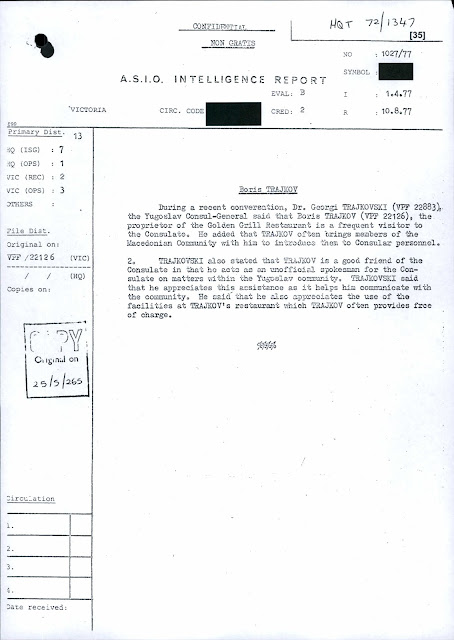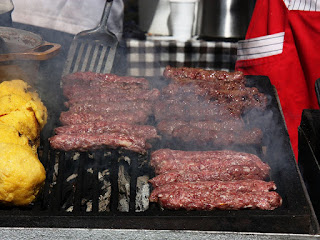 The ASIO file lists Boris Trajkov’s financial affairs, car registration, purchase of house, his business interests in running a restaurant called the Golden Grill, his political activities, and his work at 3EA Radio (SBS).
The ASIO file lists Boris Trajkov’s financial affairs, car registration, purchase of house, his business interests in running a restaurant called the Golden Grill, his political activities, and his work at 3EA Radio (SBS). A sample of the file.
TEAM UZUNOV will be seeking a response from Mr Trajkov and SBS Management.
Tuesday 11 December 2012
MR TRAJKOV’s response: THE CONSUL AND I WERE JUST FRIENDS
“They were doing their job…That was a normal situation…I was one of the most educated people here in Australia when I arrived.”
Mr Trajkov, according to the ASIO files arrived in Australia in 1967 from Macedonia, then part of Socialist Federal Republic of Yugoslavia until its independence in 1991.
Mr Trajkov said that ASIO had tried to recruit him as an inside source or informer but had failed.
“I’m sure that I heard that from inside information that they give up because I was too open.”
Mr Trajkov was an officer bearer with the Co-Ordinating Committee of Yugoslav Orgainsations, the Australian Yugoslav Welfare Society, and the Sveti Georgi (Saint George) and Sveti Prorok Ilija (Saint Elijah the Prophet) Macedonian Orthodox Churches in Melbourne. He was also a Macedonian language broadcaster and journalist with SBS Radio (3EA) in Melbourne from 1975 until his departure in 2000.
Mr Trajkov said he was a politician in Macedonia, then within Communist Yugoslavia before migrating to Australia.
Mr Trajkov dismissed claims of anything sinister over his friendship with then Yugoslav Consul General of Melbourne (1975-79), Dr Georgi Trajkovski (pictured below pointing to Yugoslav map on the wall with Australian Prime Minister Malcolm Fraser in 1979)
Dr Georgi Trajkovski’s ASIO file reveals that he had boasted in 1976 of infiltrating the Croatian and Macedonian communities and putting them under Communist Yugoslav control.
Mr Boris Trajkov said they were good friends who went shopping together but never discussed anything that was not appropriate.
“I was friends with Georgi Trajkovski and with other diplomats and Macedonian [post 1991] diplomats and the Macedonian ambassador,” he said.
ASIO was interested in Mr Trajkov’s restaurant the Golden Grill in Melbourne.
In response, Mr Trajkov said:
“The restaurant wasn’t just a Macedonian or Yugoslav restaurant but a restaurant in general…people coming not just different ethnic groups from Yugoslavia but business people, professional people, many singers from the former Yugoslavia and Macedonia… Many diplomats knew me so they would come for dinner.”
Mr Trajkov said he was proud of his achievements both in the Macedonian and Yugoslav communities. He was awarded a Medal of the Order of Australia (OAM) for services to the Macedonian community in 1990.
However, opposition to Mr Trajkov developed in the late 1980s over his driving role, with support from Federal ALP Members of Parliament Dr Harry Jenkins Senior and Lewis “Bata” Kent, in building an Australian-Yugoslav Welfare Society Childcare Centre in Lalor, in the heart of a large Macedonian migrant population, many of whom were ethnic Macedonians from within the modern borders of Greece and felt marginalised or saw it as a way of dividing the community.
A disillusionment with Yugoslavia began to take hold within the Australian-Macedonian community in the late 1980s as Belgrade was seen as not standing up for Macedonian ethnic rights in Greece. In 1991 Yugoslavia disintegrated into the successor states of Federal Republic of Yugoslavia(Serbia-Montenegro), Croatia, Slovenia, Macedonia, Bosnia-Hercegovina and later Kosovo in 1999. The whole region was racked by war for nearly a decade.
In 1988 The Australian Macedonian Weekly newspaper and its editor Jim Thomev campaigned against Mr Trajkov’s Yugoslav Childcare Centre in Lalor as this front page shows:
Mr Thomev wrote: “If Mr Trajkov believes that he has the legitimacy to represent the Macedonian people as Yugoslavs let him consult democratically with all the 130 odd organizations in Victoria to test his mandate. Better still he should tried to tell the 5,000 Macedonians who marched on La Trobe [University, in Bundoora, Melbourne] on 5 March this year that they were ‘Yugoslav.'”
Balkan passions stirred– the momentous 1988 Melbourne Macedonian community demonstration at La Trobe University against a Greek academic seminar trying to “prove the Greekness of Macedonia. Originally a rallying cry for human rights for ethnic Macedonians living in Greece it also was a turning point in the community’s relationship with Socialist Federal Yugoslavia and its refusal to raise the human rights issue with neighbouring Greece.
At a fairwell cocktail party for Dr Georgi Trajkovski in 1979 after completing his term as Yugoslav Consul General in Melbourne, the then Greek Consul toasted the departing Yugoslav diplomat. The ASIO file includes the guest list.
(end)






